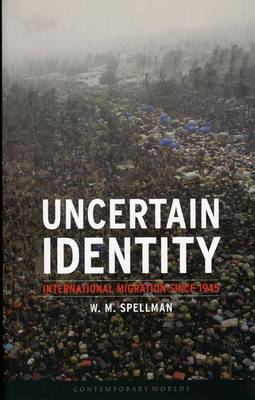
Je cadeautjes zeker op tijd in huis hebben voor de feestdagen? Kom langs in onze winkels en vind het perfecte geschenk!
- Afhalen na 1 uur in een winkel met voorraad
- Gratis thuislevering in België vanaf € 30
- Ruim aanbod met 7 miljoen producten
Je cadeautjes zeker op tijd in huis hebben voor de feestdagen? Kom langs in onze winkels en vind het perfecte geschenk!
- Afhalen na 1 uur in een winkel met voorraad
- Gratis thuislevering in België vanaf € 30
- Ruim aanbod met 7 miljoen producten
Zoeken
Omschrijving
Globalization is the defining phenomenon of the twenty-first century and migration is the cornerstone of its economic and social force. Uncertain Identity examines international movements of peoples over the past sixty years to show what migration patterns have meant to the economic and social systems of countries around the world.
W. M. Spellman chronicles how after 1945, migration patterns expanded in numbers of people and origin countries, due to overpopulation, poverty, violent conflicts, and the lowered costs of air travel. Uncertain Identity sets these patterns in the context of issues such as the impact of voluntary and forced relocation on the migrants and destination countries, the significance of south-to-north migrations, and recent enactments of restrictive immigration measures in developed nations. Spellman also considers temporary and refugee migrations and the ways in which refugees maintain cultural traditions despite their new environments.
An incisive study with global breadth, Uncertain Identity offers invaluable analysis for specialists in political science, sociology, and economics.
W. M. Spellman chronicles how after 1945, migration patterns expanded in numbers of people and origin countries, due to overpopulation, poverty, violent conflicts, and the lowered costs of air travel. Uncertain Identity sets these patterns in the context of issues such as the impact of voluntary and forced relocation on the migrants and destination countries, the significance of south-to-north migrations, and recent enactments of restrictive immigration measures in developed nations. Spellman also considers temporary and refugee migrations and the ways in which refugees maintain cultural traditions despite their new environments.
An incisive study with global breadth, Uncertain Identity offers invaluable analysis for specialists in political science, sociology, and economics.
Specificaties
Betrokkenen
- Auteur(s):
- Uitgeverij:
Inhoud
- Aantal bladzijden:
- 272
- Taal:
- Engels
- Reeks:
Eigenschappen
- Productcode (EAN):
- 9781861893642
- Verschijningsdatum:
- 1/05/2008
- Uitvoering:
- Paperback
- Formaat:
- Trade paperback (VS)
- Afmetingen:
- 138 mm x 215 mm
- Gewicht:
- 308 g

Alleen bij Standaard Boekhandel
+ 44 punten op je klantenkaart van Standaard Boekhandel
Beoordelingen
We publiceren alleen reviews die voldoen aan de voorwaarden voor reviews. Bekijk onze voorwaarden voor reviews.









